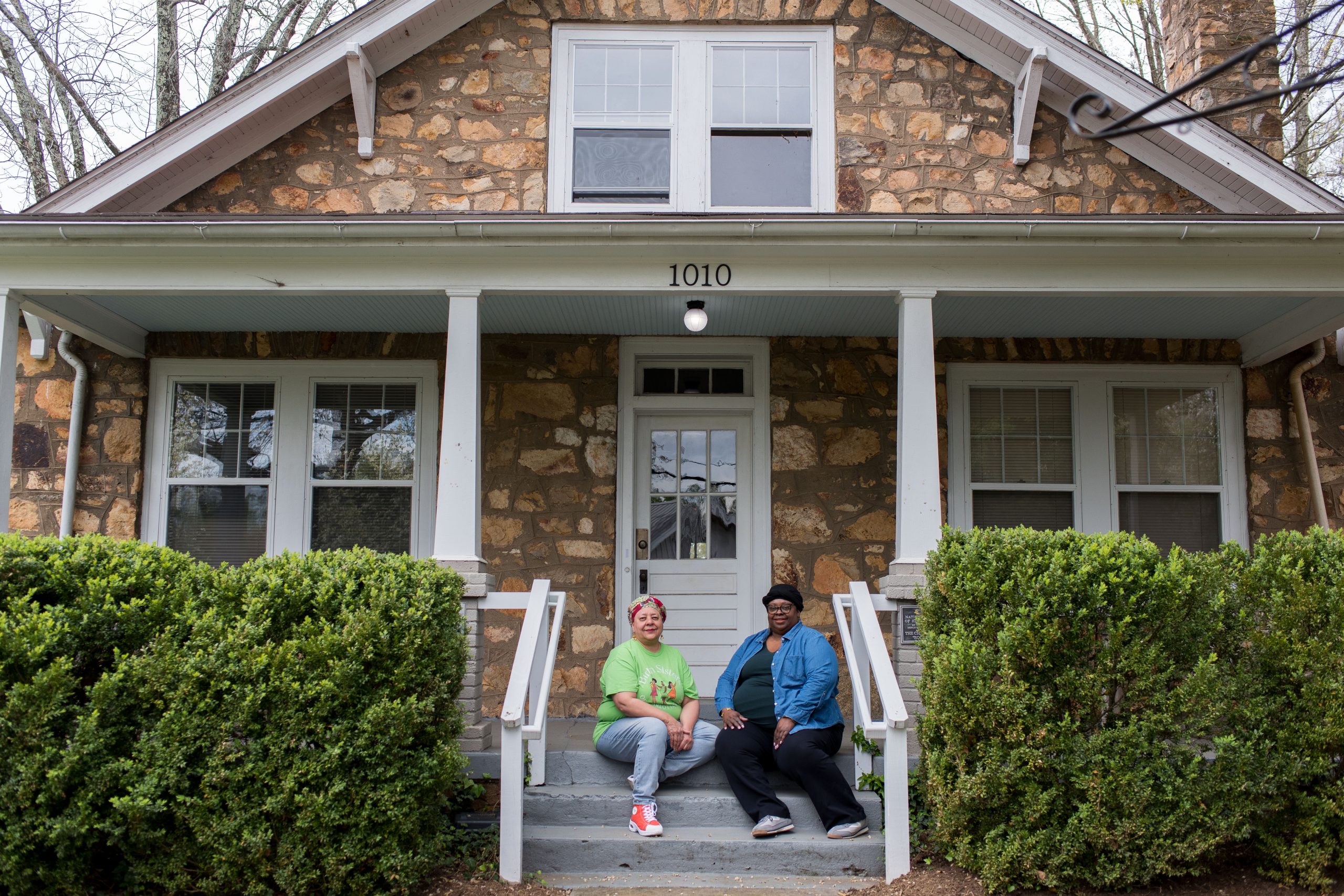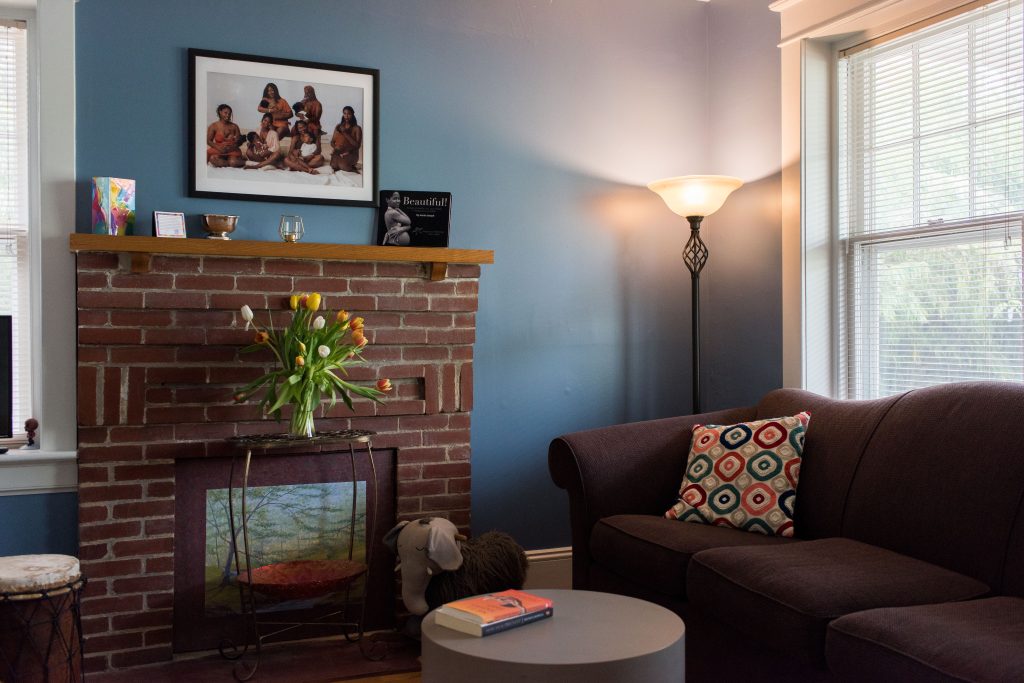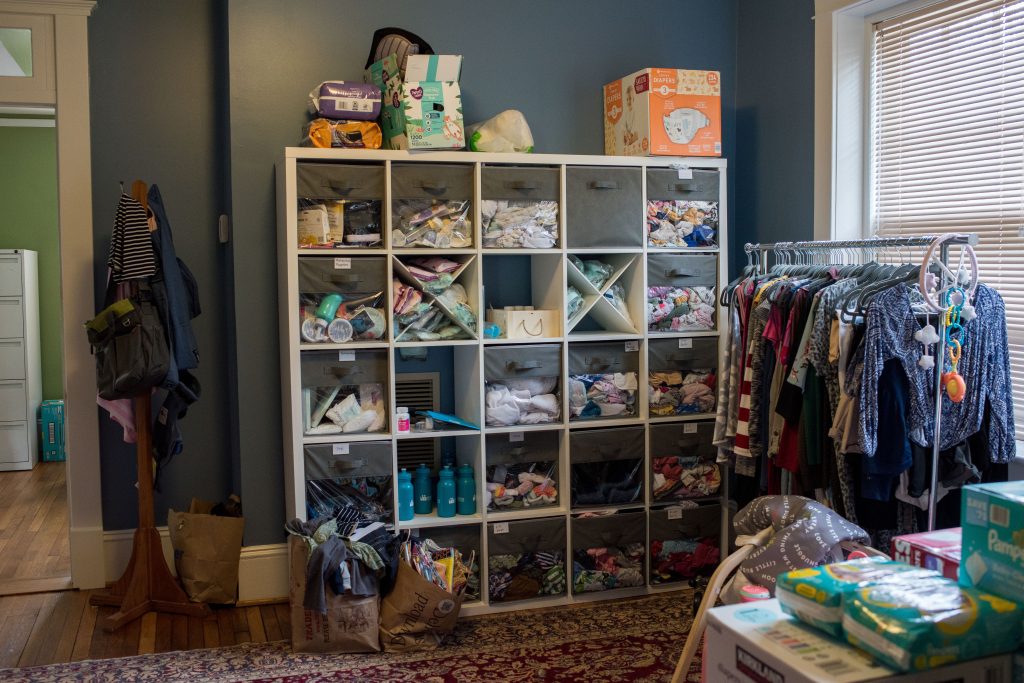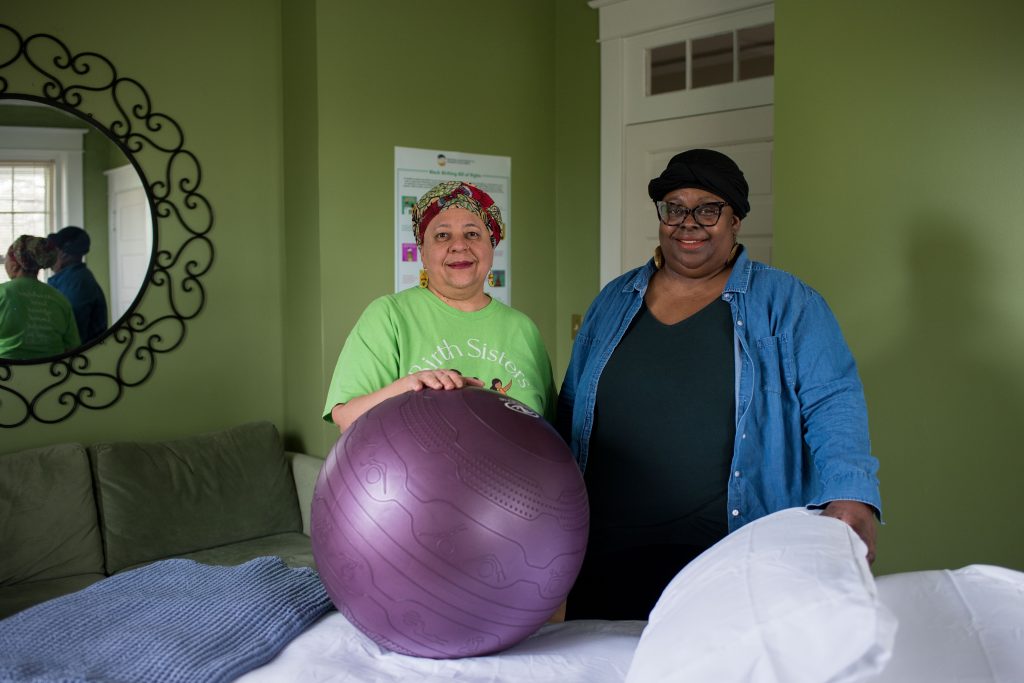Birth Sisters of Charlottesville Seek to Make Women of Color Feel at Home


By Sonia Montalvo I Photos by Kori Price
Photo of C.B Holt house plaque
Walking into the door of the Birth Sisters of Charlottesville office, you begin to appreciate the intentionality behind Doreen Bonnet and Lisa Brown’s belief in wanting the space to “feel like home” for Black mothers. The perched “rock house” bungalow the group resides in, houses Charlottesville’s only Black women-focused Doula Collective where both Doreen and Lisa sit at the helm. Built in 1926 by Black Carpenter Charles B. Holt, the house was later passed on to his stepson Leroy Preston and his wife Asalie Minor Preston, both prominent figures in the area. In 2006, the Legal Aid Justice Center (LAJC) obtained and restored the home. Through a chance encounter with an LAJC employee, Bonnet and Brown learned about the space, and in 2022 moved into the historical site. With eighteen dedicated doulas on the team, Birth Sisters of Charlottesville, or BSC, offers community-based doula services to mothers of color during pregnancy and postpartum.
The work of Birth Sisters of Charlottesville started in 2016 as a project called Sisters Keeper Doula Collective. The organization is now spearheaded by Doreen as Executive Director who initially served as a doula under the previous name. During the reorganization period, Doreen alongside members Charlsie Stratton, Zakiah Pierre, and current Deputy Executive Director, Lisa Brown did not want to lose sight of the goal of providing support to moms of color and the group decided they would continue to move forward. in 2020 the group reorganized as an official non-profit under their current name.
Doulas and their work can be traced back centuries, however, society is often confused about the role of a doula and their importance to the childbirth process. A doula serves as a companion to soon-to-be mothers by providing pregnancy and postpartum education, guidance, emotional support, and physical comfort through both pregnancy and childbirth.
Women trained by BSC fill the unique role of community-based doulas, which differentiate from traditional doulas by offering holistic wraparound support to birthing persons. Lisa states, “A community-based doula goes beyond just birth. There might be a client who is having issues with housing, so we don’t say “oh well that’s too bad, I’m sorry,” of course, we’re going to do what we can to help connect them to others who may be able to help.” The organization prides itself on being an active liaison between the mothers they service and the community resources they are assisting them with obtaining. The in-depth assistance the collective provides during their time with clients has helped new mothers find solutions to issues like but not limited to, food insecurity, domestic violence, and employment issues. “We don’t just give them a phone number. We try our best to make a connection with someone at another helping agency or someone that we are aware of who provides that kind of support.”
In Bonnet’s recollection of the genesis of Birth Sisters, she shares, “prior to us being incorporated, none of us really had any titles so we actually worked for free for almost 9 months. We did a lot of the administrative work; we were able to keep some of the doulas that were still seeing clients. Our funders at the time agreed to pay the doulas their stipends, but as far as the work that we were doing administratively, we went uncompensated.”
Once incorporated, the Co-Directors were able to fully step into their roles and begin their journey of expanding the organization’s impact within the community. The group’s work to disrupt sometimes-fatal norms and disparities of childbirth that affect Black women and women of color, is changing the Charlottesville area one mother at a time. “

Photo of BSC Welcome Womb Boutique
Birth Sisters offers their core services of prenatal care, postpartum care, and lactation to women with low and no-cost options available. Those who receive Medicaid can participate in BSC’s services free of cost. The organization also offers a “deep sliding scale” to others and shares that since their inception, they haven’t had to turn anyone away. The organization also provides support in other ways by hosting community events, offering services such as maternity reiki, and yoga, and even featuring a free Welcome Womb boutique stocked with essential items for mothers and their children.

Left to Right: Co-Directors Doreen Bonnet and Lisa Brown
The CDC reports that Black women are “three times more likely to die from a pregnancy-related cause than White women.” Working with thirty-seven families in 2023, BSC reports out of the thirty-seven families they served, there were zero infant and maternal losses. Though this serves as a major success, both Brown and Bonnet say one of their biggest milestones to date is shared trust. Brown exclaims, “They trust us, that in their most vulnerable time. That is why they are open to us coming into their home because they know that we’re not there to judge them. We are there to hold space and be there to support them through the process.”
Outside of the services Birth Sisters offer in-house, the work they are doing to partner with outside organizations to provide care for the women they serve is a true testament to their organizational mission of dismantling root causes of systemic maternal health disparities for Black, Indigenous, People of Color. Now in partnership with the University of Virginia, the women are working to bring about change in hospital protocols. “In terms of the things that we do outside of helping our moms directly, we do advocate with different parties and different organizations, hospitals, whatever, that have some kind of impact on the care of Black women during their birth. One of the key things that we were able to do is that, at UVA, doulas were considered visitors. [This] means that during the pandemic, we couldn’t even get into the hospital room. And when we did, we were limited to the visitor policy. So we had meetings with the head of the OB departments at UVA, and as of today, we are no longer visitors. We are part of the care team. We have UVA badges. We can come and go as we need to.” The Birth Sisters also have partnered with the University’s BIPOC med students in their Patient Student Partnership program. “We’re in the second year of this program, where they [medical students] will be assigned to one of our clients as well and they support them by going to their doctor’s appointments with them and helping to educate.” At a State level, both directors serves on state wide initiatives related to maternal health in Virginia to further their mission of advocacy. The Birth Sisters have also helped to create the Black Birth plan for Medical providers, to further educate them on the needs of Black women patients.
While both Lisa and Doreen believe there is still work to do to eradicate the disparities Black mothers face during childbirth, it is impossible to ignore the institution they have become for the greater Charlottesville region. Birth Sisters of Charlottesville have the unique space and opportunity to continue advocating and championing women of color during their childbirth journeys.

Student loans often follow borrowers for years, sometimes decades. Even people who fully understand how much they borrowed can feel...

It was a busy week for RIA aggregators. There were a few large moves, including $235 billion multi-family office Cresset...

Blog Posts Archives UnfavoriteFavorite February 27, 2026 Weave: The Social Fabric Project Subscribe to Weave’s Newsletter This story was originally...